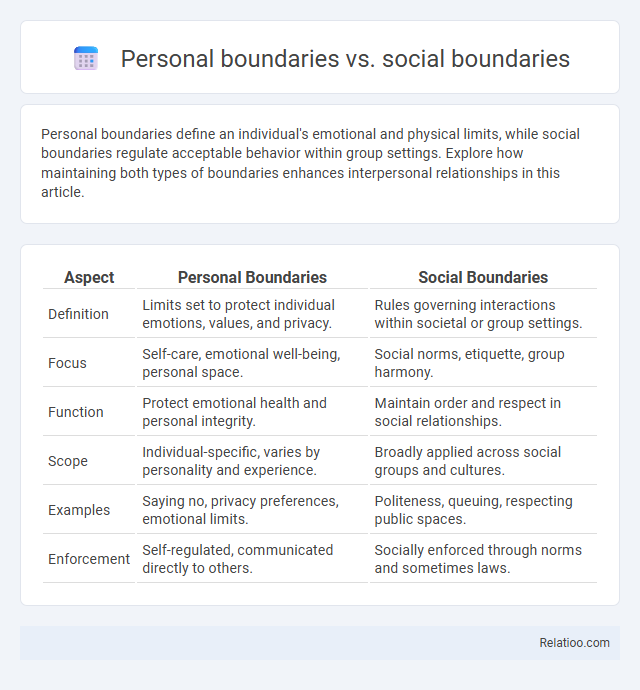Personal boundaries define an individual's emotional and physical limits, while social boundaries regulate acceptable behavior within group settings. Explore how maintaining both types of boundaries enhances interpersonal relationships in this article.
Table of Comparison
| Aspect | Personal Boundaries | Social Boundaries |
|---|---|---|
| Definition | Limits set to protect individual emotions, values, and privacy. | Rules governing interactions within societal or group settings. |
| Focus | Self-care, emotional well-being, personal space. | Social norms, etiquette, group harmony. |
| Function | Protect emotional health and personal integrity. | Maintain order and respect in social relationships. |
| Scope | Individual-specific, varies by personality and experience. | Broadly applied across social groups and cultures. |
| Examples | Saying no, privacy preferences, emotional limits. | Politeness, queuing, respecting public spaces. |
| Enforcement | Self-regulated, communicated directly to others. | Socially enforced through norms and sometimes laws. |
Defining Personal Boundaries
Personal boundaries define your limits for acceptable emotional and physical interactions, establishing how much space you need to feel safe and respected. Social boundaries regulate appropriate behavior and communication within different social contexts, such as work or casual gatherings, ensuring harmonious interactions. Understanding and asserting your personal boundaries helps maintain your well-being while navigating broader social boundaries effectively.
Understanding Social Boundaries
Understanding social boundaries involves recognizing the unwritten rules that govern interactions within various social contexts, distinguishing them from personal boundaries which protect individual emotional and physical space. Social boundaries often define acceptable behavior in public or group settings, ensuring respect and harmony in your relationships and community. Being aware of these boundaries helps you navigate social dynamics effectively, fostering mutual respect and preventing conflicts.
Key Differences Between Personal and Social Boundaries
Personal boundaries define an individual's limits for emotional, physical, and mental space, ensuring self-respect and autonomy. Social boundaries regulate interactions and behaviors within group settings, maintaining respect and order among community members. The key difference lies in personal boundaries being inward-focused and self-protective, while social boundaries are outward-focused and designed to sustain social harmony.
The Importance of Personal Boundaries
Personal boundaries define your individual limits and protect your emotional well-being, establishing a clear sense of self in relationships. Social boundaries regulate interactions within groups, ensuring respectful communication and mutual understanding in various social contexts. Prioritizing personal boundaries is crucial for maintaining mental health, preventing burnout, and fostering authentic connections with others.
The Role of Social Boundaries in Society
Social boundaries delineate the acceptable behaviors and interactions within a community, shaping societal norms and cultural values. These boundaries facilitate social order by defining group identities and maintaining harmony through shared expectations. Understanding your social boundaries helps navigate interpersonal relationships and reinforces your sense of belonging within the broader society.
How to Recognize Personal Boundary Violations
Recognizing personal boundary violations requires understanding the differences between personal, social, and societal boundaries. Personal boundaries protect your emotions, values, and physical space, while social boundaries govern appropriate interactions in group settings. Your awareness of discomfort, unease, or disrespect during communication can signal when someone crosses these personal boundaries, helping you assert and maintain your limits effectively.
Navigating Social Boundary Expectations
Navigating social boundary expectations requires understanding the distinction between personal boundaries, which protect your individual comfort and values, and social boundaries that define acceptable behavior within a group or culture. Social boundaries often reflect collective norms and can vary based on context, making it essential to recognize how your personal boundaries align or conflict with these shared standards. Effectively managing this balance enhances your interpersonal relationships while respecting broader social expectations.
Strategies for Setting Healthy Personal Boundaries
Setting healthy personal boundaries involves clearly defining limits related to emotional, physical, and mental space to protect well-being and foster self-respect. Strategies include assertive communication, consistent self-awareness, and learning to say no without guilt to prevent boundary violations. Maintaining these boundaries distinct from social boundaries, which govern general societal interactions, helps individuals navigate relationships while preserving autonomy and respect.
Respecting Social Boundaries in Diverse Environments
Respecting social boundaries in diverse environments requires understanding the distinction between personal boundaries, which protect your individual feelings and space, and social boundaries that govern acceptable behaviors within group settings. Social boundaries vary across cultures, necessitating sensitivity to different norms and communication styles to foster mutual respect and avoid misunderstandings. Prioritizing awareness and adapting to these boundaries enhances interpersonal relationships and promotes inclusive, respectful interactions.
Balancing Personal Needs and Social Norms
Personal boundaries define individual limits for emotional and physical comfort, while social boundaries are shared expectations within communities that guide acceptable behavior. Balancing personal needs with social norms requires respecting one's own limits while adapting to collective standards to maintain healthy relationships. Effective boundary management fosters mutual respect, emotional well-being, and social harmony.

Infographic: Personal boundaries vs Social boundaries
 relatioo.com
relatioo.com